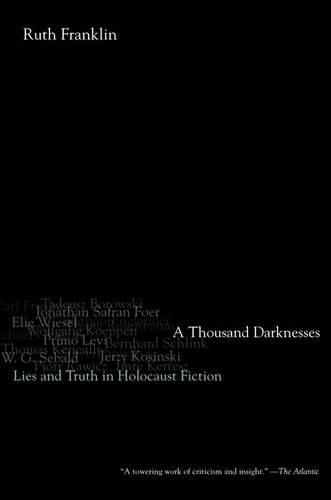Readings Newsletter
Become a Readings Member to make your shopping experience even easier.
Sign in or sign up for free!
You’re not far away from qualifying for FREE standard shipping within Australia
You’ve qualified for FREE standard shipping within Australia
The cart is loading…






What is the difference between writing a novel about the Holocaust and fabricating a memoir? Do narratives about the Holocaust have a special obligation to be truthful - i.e., faithful to the facts of history? Or, in other words, when is it okay to lie about the Holocaust? In her provocative study A Thousand Darknesses: Truth and Lies In Holocaust Fiction , Ruth Franklin investigates these questions as they arise in the most significant works of fiction about the Holocaust, from Tadeusz Borowski’s Auschwitz stories to Jonathan Safran Foer’s postmodernist family history. Franklin argues that the memory-obsessed culture of the last few decades has led to a mistaken focus on testimony as the primary form of writing about the Holocaust. As even the most canonical Holocaust texts have come under scrutiny for their fidelity to the facts, we have lost sight of the essential role that imagination plays in the creation of any literary work, including - perhaps especially - the memoir. Taking a fresh look at memoirs by Elie Wiesel and Primo Levi, and examining novels by writers such as Piotr Rawicz, Jerzy Kosinski, W.G. Sebald, and Wolfgang Koeppen, Franklin makes a persuasive case for literature as an equally vital vehicle for understanding the Holocaust. The result is a study of immense depth and range that offers a lucid view of an often cloudy field.
$9.00 standard shipping within Australia
FREE standard shipping within Australia for orders over $100.00
Express & International shipping calculated at checkout
What is the difference between writing a novel about the Holocaust and fabricating a memoir? Do narratives about the Holocaust have a special obligation to be truthful - i.e., faithful to the facts of history? Or, in other words, when is it okay to lie about the Holocaust? In her provocative study A Thousand Darknesses: Truth and Lies In Holocaust Fiction , Ruth Franklin investigates these questions as they arise in the most significant works of fiction about the Holocaust, from Tadeusz Borowski’s Auschwitz stories to Jonathan Safran Foer’s postmodernist family history. Franklin argues that the memory-obsessed culture of the last few decades has led to a mistaken focus on testimony as the primary form of writing about the Holocaust. As even the most canonical Holocaust texts have come under scrutiny for their fidelity to the facts, we have lost sight of the essential role that imagination plays in the creation of any literary work, including - perhaps especially - the memoir. Taking a fresh look at memoirs by Elie Wiesel and Primo Levi, and examining novels by writers such as Piotr Rawicz, Jerzy Kosinski, W.G. Sebald, and Wolfgang Koeppen, Franklin makes a persuasive case for literature as an equally vital vehicle for understanding the Holocaust. The result is a study of immense depth and range that offers a lucid view of an often cloudy field.